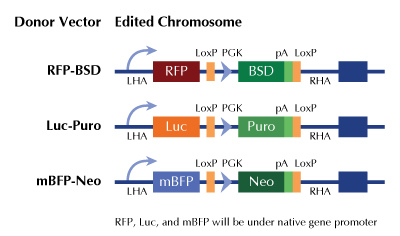CIITA Human Gene Knockout Kit (CRISPR)
CAT#: KN222253LP
CIITA - human gene knockout kit via CRISPR, HDR mediated
Functional Cassette: GFP-puro RFP-BSD mBFP-Neo
HDR-mediated knockout kit validation
USD 1,657.00
4 Weeks*
Specifications
| Product Data | |
| Format | 2 gRNA vectors, 1 Luciferase-Puro donor, 1 scramble control |
| Donor DNA | Luciferase-Puro |
| Symbol | CIITA |
| Locus ID | 4261 |
| Components |
KN222253G1, CIITA gRNA vector 1 in pCas-Guide CRISPR vector KN222253G2, CIITA gRNA vector 2 in pCas-Guide CRISPR vector KN222253LPD, donor DNA containing left and right homologous arms and Luciferase-Puro functional cassette. GE100003, scramble sequence in pCas-Guide vector |
| Disclaimer | These products are manufactured and supplied by OriGene under license from ERS. The kit is designed based on the best knowledge of CRISPR technology. The system has been functionally validated for knocking-in the cassette downstream the native promoter. The efficiency of the knock-out varies due to the nature of the biology and the complexity of the experimental process. |
| Reference Data | |
| RefSeq | NM_000246, NM_001286402, NM_001286403, NR_104444 |
| UniProt ID | P33076 |
| Synonyms | C2TA; CIITAIV; MHC2TA; NLRA |
| Summary | This gene encodes a protein with an acidic transcriptional activation domain, 4 LRRs (leucine-rich repeats) and a GTP binding domain. The protein is located in the nucleus and acts as a positive regulator of class II major histocompatibility complex gene transcription, and is referred to as the "master control factor" for the expression of these genes. The protein also binds GTP and uses GTP binding to facilitate its own transport into the nucleus. Once in the nucleus it does not bind DNA but rather uses an intrinsic acetyltransferase (AT) activity to act in a coactivator-like fashion. Mutations in this gene have been associated with bare lymphocyte syndrome type II (also known as hereditary MHC class II deficiency or HLA class II-deficient combined immunodeficiency), increased susceptibility to rheumatoid arthritis, multiple sclerosis, and possibly myocardial infarction. Several transcript variants encoding different isoforms have been found for this gene. [provided by RefSeq, Nov 2013] |
Documents
| Product Manuals |
| FAQs |
| SDS |
Resources
Other Versions
| SKU | Description | Size | Price |
|---|---|---|---|
| KN222253 | CIITA - human gene knockout kit via CRISPR, HDR mediated |
USD 1,657.00 |
|
| KN222253BN | CIITA - human gene knockout kit via CRISPR, HDR mediated |
USD 1,657.00 |
|
| KN222253RB | CIITA - human gene knockout kit via CRISPR, HDR mediated |
USD 1,657.00 |
|
| KN422253 | CIITA - KN2.0, Human gene knockout kit via CRISPR, non-homology mediated. |
USD 1,657.00 |
|
| GA102905 | CIITA CRISPRa kit - CRISPR gene activation of human class II major histocompatibility complex transactivator |
USD 1,657.00 |
{0} Product Review(s)
Be the first one to submit a review






























































































































































































































































 Germany
Germany
 Japan
Japan
 United Kingdom
United Kingdom
 China
China
